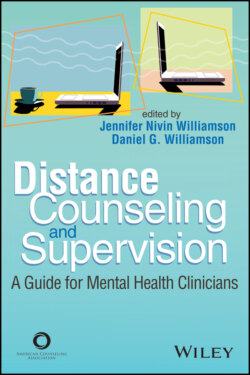Читать книгу Distance Counseling and Supervision - Группа авторов - Страница 37
Notes and Documentation
ОглавлениеCounselors should be aware of the guidelines for documenting communication with clients. Some licensure boards or state laws require that all communications, including emails and/or texts, be included in the client’s record. Counselors should consider how these communications should be included in the client’s counseling file and outline those procedures in the informed consent (ACA, 2014; AMFTRB, 2016; NBCC, 2016a, 2016b).
CNA and Healthcare Providers Service Organization (2019) offered the following list of risk management recommendations to counselors who engage in telebehavioral health services:
Gain the necessary skills before initiating distance counseling.
Understand all laws and ethical guidelines governing client interactions, and practice in accordance with the standard of care, the limits of one’s license/certification, and all regulations and ethical guidelines.
Check state and third-party requirements related to distance counseling, licensure, and credentialing.
Check regulatory board requirements, or if using a third-party for reimbursement of telebehavioral health services, review contractual requirements for client assessment, coding, and claims submission.
Recognize potential issues regarding confidentiality, privacy, cyberstalking, and identity theft.
Review relevant regulatory requirements.
Follow encryption standards when communicating with clients online, and when consulting with other practitioners.
Evaluate whether distance counseling is appropriate for a client.
When initiating the online relationship, verify the client’s identity.
Obtain informed consent, including a discussion of the purpose of the counseling, privacy and confidentiality, and use of technology with the client.
Advise the client of their responsibility to be in a private space.
Obtain informed consent, including a discussion of the purpose of the counseling, privacy and confidentiality, and use of technology with the client.
Establish a written plan for how to handle an emergent or urgent situation.
Maintain records that include documentation of observations, services delivered, and treatment plans.
Transcripts of counseling sessions can be helpful to the client and the counselor; however, they may be used as evidence in a legal action.
